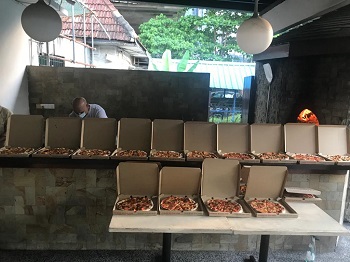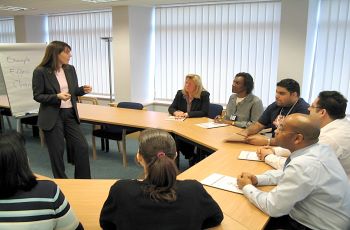The business of coronavirus
 The headlines are startling: 20 million people registering unemployed in the USA in just four weeks, potentially £7.2 trillion knocked off Gross Domestic Product (GDP) over the next two years, the worst economic decline since the Great Depression.
The headlines are startling: 20 million people registering unemployed in the USA in just four weeks, potentially £7.2 trillion knocked off Gross Domestic Product (GDP) over the next two years, the worst economic decline since the Great Depression.
From the service sector to aviation and even Premier League football – nowhere appears invulnerable to the financial impact of coronavirus.
But we are also seeing the business community respond actively and collaboratively to this global crisis. Whether it’s the owner of Twitter Jack Dorsey personally donating $1 billion (over a quarter) of his personal wealth to tackle the virus, Formula 1 teams joining to design a new ventilator or even simply untold technophobes learning how to hold meetings remotely – the world is reacting.
During this time of unprecedented change we asked three University experts to share their insights; how businesses can respond creatively, why supermarket supply chains have come under such pressure and the importance of inclusive and diverse leadership.
You can also sign up to Nottingham University Business School's "Leadership: Toward a post-pandemic business as usual" webinar - information at the end of this article.
Creativity after the crisis
The Nobel Prize-winning economist Milton Friedman argued that ‘Only a crisis - actual or perceived - produces real change’. There is no doubt that we are experiencing an actual crisis now, but what changes are likely to endure when it is over?

It is likely that after the crisis, the values of universal healthcare, financial security and environmental sustainability will endure and organisations which innovate in these areas will thrive. We have seen extraordinary co-operation between the government, charities, universities and businesses during the crisis and we expect this to continue.
Our research considers how entrepreneurs and organisations develop new products, services and ways of doing business and we have seen exceptional levels of such innovation over a very short period. This supports our findings that anyone is capable of innovation if the environment is right.
Likewise, organisations which co-operate to share their knowledge on common innovation challenges and then work together to address those challenges are those most likely to endure through disruptive change.
We may be wrong about the values which endure after the crisis, but we are confident entrepreneurs and organisations that survive and thrive will not be those which are exclusively inward facing and cost focussed, but rather those that are the most open to doing things differently in response to the changing values of society.
The supply chain disruptions of Covid-19. Why empty shelves say more about resilience and trust than consumer irrationality
For grocery demand March was like another Christmas. With the key difference that grocery retailers prepare for the Christmas peak months in advance, fill their stores and warehouses with stock and increase capacity by adding lorries, warehouse and store personnel to cope with the extra demand. And of course, consumers have time to prepare too, pre-order key items, and stock up on non-perishables in advance.

The sudden message that we may have to stay at home, many not being able to leave their homes for twelve weeks, created uncertainty and concerned shoppers started buying extra to be prepared, bridging the longer gaps between shopping trips.
Empty shelves cause concern and encourage shoppers to stock up even more, as individual shoppers cannot know whether there will be any stock coming soon. This seems to be logical behaviour at an individual level, but at a system level this turns into a problem, as some shoppers will be left with nothing to buy.
Most of the items we can still see out of stock are those with fundamental shifts in demand pattern: a large increase of home baking as nobody can visit cafés and children require entertainment at home. And whilst café chains are shut, the supply they would usually take up cannot always be easily rerouted into supermarkets easily - requiring repackaging or needing to match different product specifications and labelling requirements.
And there are worrying signs that to increase supply availability, some organisations drop good purchasing practices. Most of us have read about the panic-buying of millions of non-functioning antibody tests and the sending out of product specifications for ventilators that are unsuitable for patient treatment.
How organisations responded to the exogenous shock of Covid-19 related supply chain disruptions, how well they were prepared or not, and how supply chains will transform to cope with the ‘new normal’ will be the subject of classroom case studies and supply chain management discussions for years to come.
Dr Alexander Trautrims
Associate Professor in Supply Chain & Operations Management
Diversity and inclusion: The key to leading into a ‘new normal’
The COVID-19 pandemic provides us with one of those rare moments in time to shift focus and view leadership differently, to see how the prevailing character of leadership of the past gives way to a more inclusive practice that serves us through this crisis into a new, different ‘normal’.

Today, quality of leadership makes the difference between certainty and ambiguity and indeed at its most critical, the difference between life and death. Now, in response to the volatility and ambiguity of the current context, a more distributed, inclusive notion of leadership is coming to the fore.
What should I do? Making sense of uncertainty (Leadership as a set of skills)
Those in positions of leadership must have the capacity to read a situation and make sense of it in their context. They then must make sense of it for the short term (what do we need to do now?), medium term given different scenarios (what will we need to do next?), and the long term (how do we see ourselves in the future?). Intuition and strategic thinking are needed to achieve a planned ‘new normal’ and leaders must be prepared to invite in different voices with a different view of what the context offers in terms of opportunity and risk. No leader is able to generate a view broad enough to manage this alone.
Don’t just stand there, do something (Leadership as a job role)
One of the most important responsibilities of a leader is to act. While information may be incomplete and fuzzy, leadership demands decisive action. What leaders actually do now will have broad ranging impact when the current crisis has passed. The tension between being right and being slow to act has rarely been more prominent. Diversity of views and experience, drawn from all levels of an organisation can minimise unintended consequence and drive action in a more informed manner.
How should I do this? (Leadership as a philosophy)
Leadership roles carry an implicit expectation that action will be guided not only by evidence or data but that leaders will act in line with expected values. Often unfairly thought of as warm and fuzzy statements created by consultants to hang on the CEO’s office wall, leaders who rely on personal and/or organisational value statements have an anchor for decision making and action.
Given that the kaleidoscope of contextually bound action may be unclear at times, inclusion becomes important too. Diverse voices should be heard as a safeguard against unintended consequences and an avenue to creativity and alternative, perhaps new options.
Perhaps now untethered from past contextual boundaries, distributed leadership drawing on diverse capabilities and voices is central to effective short-term responses. Inclusion then becomes the architect of revised, indeed, better ways of doing business in a future, perhaps radically different ‘normal’.
Dr Theresa Simpkin
Associate Professor (Teaching) & Director of the Senior Leadership Degree Apprenticeship – Executive MBA
Posted on Wednesday 22nd April 2020